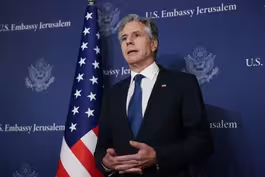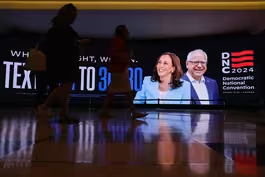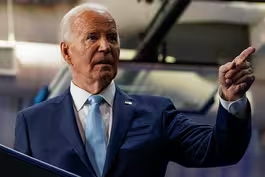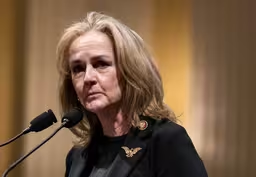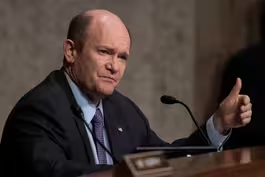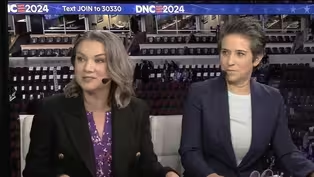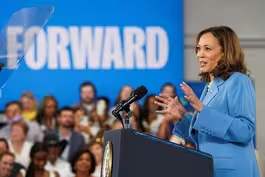
Former U.S. diplomat on Russia’s ‘war against the West’
Clip: 8/19/2024 | 8m 41sVideo has Closed Captions
Former U.S. diplomat shares details of Russia’s ‘war against the West’ in new book
Over the past decade, the U.S.-Russia relationship has deteriorated to its lowest point since the Cold War. Ambassador John Sullivan had a front-row seat to all of it and wrote about it in his new book, “Midnight in Moscow: A Memoir from the Front Lines of Russia's War Against the West.” Nick Schifrin speaks with Sullivan about Putin’s relations with Western countries and war in Ukraine.
Problems playing video? | Closed Captioning Feedback
Problems playing video? | Closed Captioning Feedback
Major corporate funding for the PBS News Hour is provided by BDO, BNSF, Consumer Cellular, American Cruise Lines, and Raymond James. Funding for the PBS NewsHour Weekend is provided by...

Former U.S. diplomat on Russia’s ‘war against the West’
Clip: 8/19/2024 | 8m 41sVideo has Closed Captions
Over the past decade, the U.S.-Russia relationship has deteriorated to its lowest point since the Cold War. Ambassador John Sullivan had a front-row seat to all of it and wrote about it in his new book, “Midnight in Moscow: A Memoir from the Front Lines of Russia's War Against the West.” Nick Schifrin speaks with Sullivan about Putin’s relations with Western countries and war in Ukraine.
Problems playing video? | Closed Captioning Feedback
How to Watch PBS News Hour
PBS News Hour is available to stream on pbs.org and the free PBS App, available on iPhone, Apple TV, Android TV, Android smartphones, Amazon Fire TV, Amazon Fire Tablet, Roku, Samsung Smart TV, and Vizio.
Providing Support for PBS.org
Learn Moreabout PBS online sponsorshipWILLIAM BRANGHAM: Since Ukraine's incursion into Kursk, Russia has postponed rare talks between the two nations that were scheduled for later this month.
Those talks were to discuss a possible halt on attacks targeting each other's energy infrastructure.
Meanwhile, the Kremlin's allies warned that Ukraine's incursion has increased the chances of world war.
That saber-rattling is a routine Russian tactic and one few people have seen as closely as the most recent former U.S. ambassador to Russia, who has written a new book and recently sat down with Nick Schifrin.
NICK SCHIFRIN: Over the past decade, the U.S.-Russia relationship has deteriorated to its lowest point since the Cold War, election interference, attempted international assassinations, cyber warfare, and the full-scale invasion of Ukraine.
Ambassador John Sullivan had a front-row seat to all of it, first as deputy secretary of state and then U.S. ambassador to Moscow for Presidents Trump and Biden.
And his new book is "Midnight in Moscow: A Memoir from the Front Lines of Russia's War Against the West."
John Sullivan, thanks very much.
Welcome to the "News Hour."
Let's begin with Ukraine's incursion into Kursk, Russia.
How will that affect Vladimir Putin's thinking?
JOHN SULLIVAN, Former U.S.
Ambassador to Russia: Well, it's already affected his standing within Russia and Russia's strategic calculations with respect to Ukraine.
They were surprised by this.
Putin was embarrassed by this.
It reveals some of his weaknesses, the fact that the Russians were unprepared, that the Russians were being slaughtered in this area are conscripts who are not supposed to be sent to the war in Ukraine.
We have seen video of what's happened to them, surrendering, killed, and so forth.
The Ukrainians have occupied, what, 1,000 square kilometers of territory.
It's a big deal.
Even the Russians on social media and in state media, who are pro-war and pro-Putin are asking, how could this have happened in our country?
But Putin can't admit to weaknesses like that.
NICK SCHIFRIN: Let me ask about another big Putin decision.
That is to make a deal... JOHN SULLIVAN: Yes.
NICK SCHIFRIN: ... with the United States and European countries, the largest prisoner swap since the end of the Cold War.
You were in the middle of multiple discussions... JOHN SULLIVAN: Right.
NICK SCHIFRIN: ... about how to get detained Americans in Russia released, including, of course, Paul Whelan, who was part of that swap.
JOHN SULLIVAN: Right.
NICK SCHIFRIN: Let me first ask you, why do you think Putin made this deal?
JOHN SULLIVAN: The key piece of the deal, from Putin's perspective, was this FSB colonel named Krasikov, who committed a murder in... NICK SCHIFRIN: In broad daylight.
JOHN SULLIVAN: In broad daylight, in front of children and families in a park in Berlin, on orders of the Kremlin to kill an opposition leader from Chechnya.
This was an officer of the FSB tasked by the Kremlin, I'm sure by Putin himself, to eliminate this individual.
NICK SCHIFRIN: Why was he so important to Putin?
What do we really know about their connection?
JOHN SULLIVAN: So, Krasikov has relationships, as I understand it, with the organization that provides Putin's bodyguards.
So this is personal.
He knows this guy, or he's close to people who know this guy.
He's one of them, FSB colonel.
That's his group.
So it's personal.
It's professional, in that it's important for him to send a message to his security services: You get an order like this in the future from me or from the Kremlin, you know we're going to stand by you and we can get you out.
NICK SCHIFRIN: What were your negotiations like with the Russians to try and release these American detainees?
JOHN SULLIVAN: Well, the problem that we had, particularly with someone like Paul, when -- Paul Whelan, when I was ambassador and then subsequently with Evan Gershkovich, the Wall Street Journal reporter, was that they were charged and convicted of espionage.
The Russians would say: We have arrested an American spy.
You come to us with potential trades of cyber criminals, a fraudster here.
NICK SCHIFRIN: And those are the people that the U.S. ended up trading?
JOHN SULLIVAN: But more than that, they got back Krasikov.
What happened before was, Nick, we didn't have in U.S. custody someone that Putin really wanted.
In this case, it was the Germans had him.
So the trick to the -- the key to the deal was broadening the scope to include the Germans.
NICK SCHIFRIN: The book begins the night of the full-scale invasion.
JOHN SULLIVAN: Yes.
NICK SCHIFRIN: You describe the scene where you end up going to the embassy in the middle of the night and staying there... JOHN SULLIVAN: Right.
NICK SCHIFRIN: ... living there, basically.
And you blame the FSB, the successor to the KGB, for their intelligence failure to think that the Russian invasion, the Russian full-scale invasion, would succeed and be welcomed by Ukrainians.
Why did they fail so much at that?
JOHN SULLIVAN: There were two basic failures.
First, the FSB didn't prepare the battle space.
They had thousands of FSB officers who had spent years with billions of dollars invested to weaken Ukrainian resistance.
And, secondly, they failed to advise the Russian president that the Ukrainian resistance was going to be as strong as it was.
NICK SCHIFRIN: Because they didn't know or they couldn't tell him the truth?
JOHN SULLIVAN: It's a combination of both, I believe.
There is a common phenomenon that we believe that Putin's larger circle of advisers are afraid to tell him bad news.
Imagine if you're a senior FSB officer.
The FSB has been given years, thousands of personnel and billions of dollars to weaken Ukraine, and your assessment is, now's not a good time to invade.
I wouldn't like to be the person delivering that message.
NICK SCHIFRIN: You write that: "The only suitable strategy for the United States and the West must be a form of 21st century containment of Russian aggression, and, of course, Russia must be stopped in Ukraine."
What does a 21st century of containment look like?
JOHN SULLIVAN: Well, first, it's got to be based on an acknowledgement that Putin is never going to surrender his war aims.
The notion that the United States, anyone in the West is going to be able to negotiate a resolution to this war that doesn't involve complete capitulation by Ukraine is wishful thinking.
I have seen members of Congress debating and -- aid to Ukraine, and why are we supporting Ukraine?
Why are we more concerned about Ukraine's border than the southern border in the United States?
It's not just about supporting Ukraine.
In fact, you can believe, as I think I have heard the Republican vice presidential candidate, J.D.
Vance, say, I don't really care about Ukraine.
OK.
But as a U.S. senator, you need to be concerned about Russian aggression.
That's what this is about.
It's opposing Russian aggression, which I believe is necessary for U.S. national security.
NICK SCHIFRIN: Let me just ask you a few questions about Donald Trump.
You were his deputy secretary of state before you were the ambassador in Moscow.
You write in the book that Trump had a - - quote -- "undisciplined style.
The White House was chaotic, unpredictable," and that the president -- quote -- "could not or would not draw a distinction between his own interests and those of the country" and -- quote -- "Trump has no interest in the ordinary duties of his office."
What impact did that have?
JOHN SULLIVAN: It made my job difficult as deputy secretary and stressful.
So, after three years, as -- on a personal level, it made me think about getting off the hot seat.
I was pretty burned out after three years of the unpredictability and lack of discipline.
It was just difficult to implement policy when the ground would seem to be shifting under our feet.
NICK SCHIFRIN: Quickly, will you vote for him again?
You voted for him last time.
JOHN SULLIVAN: I did not support him in the Republican primary this time.
I supported Governor Haley, whom I worked with closely when I was deputy secretary.
But as I write in the book, I have been a lifelong Republican.
I cast my first vote for president in 1980 for Ronald Wilson Reagan, who had -- he coined the -- I think it was he who coined what he called his 11th commandment, thou shalt not criticize a fellow Republican.
I believe I will vote for the Republican candidate for president this year, who is Donald Trump.
NICK SCHIFRIN: John Sullivan.
The book is "Midnight in Moscow."
Thank you very much.
JOHN SULLIVAN: Thanks, Nick.
My pleasure.
Blinken urges Hamas to accept bridging proposal with Israel
Video has Closed Captions
Clip: 8/19/2024 | 3m 18s | Blinken urges Hamas to accept ‘bridging proposal’ agreed to by Israel (3m 18s)
Can excited Democratic voters sustain momentum for Harris?
Video has Closed Captions
Clip: 8/19/2024 | 6m 32s | The Harris-Walz ticket has reinvigorated Democratic voters. Can they sustain the momentum? (6m 32s)
Key takeaways from the House GOP’s Biden impeachment report
Video has Closed Captions
Clip: 8/19/2024 | 3m 41s | Key takeaways from the House GOP’s Biden impeachment inquiry report (3m 41s)
Rep. Dean on what to watch in swing state of Pennsylvania
Video has Closed Captions
Clip: 8/19/2024 | 5m 29s | Rep. Madeleine Dean on what to watch in the crucial battleground state of Pennsylvania (5m 29s)
Sen. Coons on Biden’s presidency and decision to step aside
Video has Closed Captions
Clip: 8/19/2024 | 6m 43s | Sen. Coons reflects on Biden’s presidency and ‘selfless’ decision to step aside (6m 43s)
Tamara Keith and Amy Walter on Trump’s response to the DNC
Video has Closed Captions
Clip: 8/19/2024 | 9m 18s | Tamara Keith and Amy Walter on the Trump campaign’s response to the DNC (9m 18s)
What voters are saying about Harris’ policy proposals
Video has Closed Captions
Clip: 8/19/2024 | 3m 26s | What voters are saying about Harris’ policy proposals ahead of the Democratic convention (3m 26s)
Providing Support for PBS.org
Learn Moreabout PBS online sponsorshipSupport for PBS provided by:
Major corporate funding for the PBS News Hour is provided by BDO, BNSF, Consumer Cellular, American Cruise Lines, and Raymond James. Funding for the PBS NewsHour Weekend is provided by...
